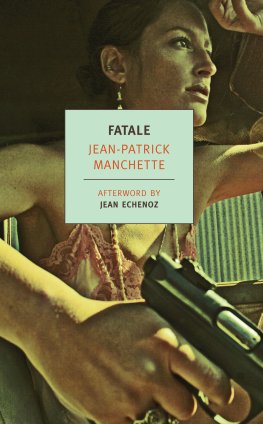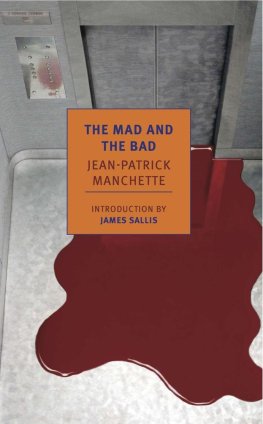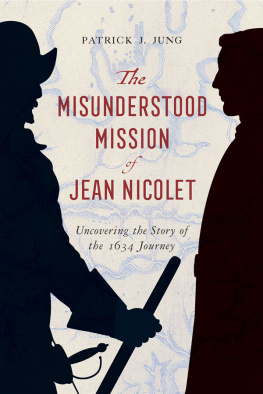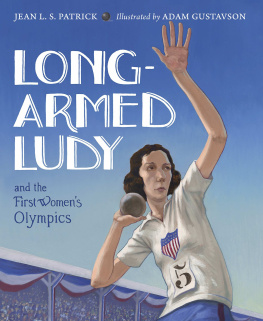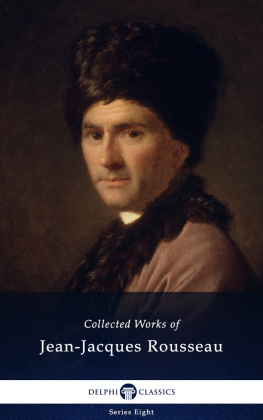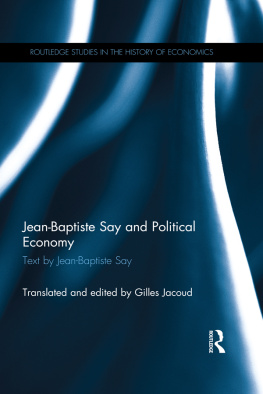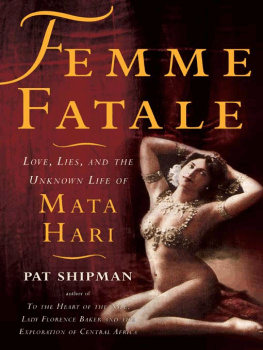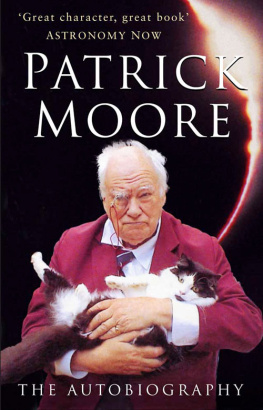Jean-Patrick Manchette - Fatale
Here you can read online Jean-Patrick Manchette - Fatale full text of the book (entire story) in english for free. Download pdf and epub, get meaning, cover and reviews about this ebook. year: 2011, publisher: New York Review Books, genre: Detective and thriller. Description of the work, (preface) as well as reviews are available. Best literature library LitArk.com created for fans of good reading and offers a wide selection of genres:
Romance novel
Science fiction
Adventure
Detective
Science
History
Home and family
Prose
Art
Politics
Computer
Non-fiction
Religion
Business
Children
Humor
Choose a favorite category and find really read worthwhile books. Enjoy immersion in the world of imagination, feel the emotions of the characters or learn something new for yourself, make an fascinating discovery.
- Book:Fatale
- Author:
- Publisher:New York Review Books
- Genre:
- Year:2011
- ISBN:978-1-59017-572-9
- Rating:3 / 5
- Favourites:Add to favourites
- Your mark:
- 60
- 1
- 2
- 3
- 4
- 5
Fatale: summary, description and annotation
We offer to read an annotation, description, summary or preface (depends on what the author of the book "Fatale" wrote himself). If you haven't found the necessary information about the book — write in the comments, we will try to find it.
Fatale — read online for free the complete book (whole text) full work
Below is the text of the book, divided by pages. System saving the place of the last page read, allows you to conveniently read the book "Fatale" online for free, without having to search again every time where you left off. Put a bookmark, and you can go to the page where you finished reading at any time.
Font size:
Interval:
Bookmark:
Jean-Patrick Manchette
Fatale
1
The hunters were six in number, men mostly fifty or older, but also two younger ones with sarcastic expressions. They all wore check shirts, sheepskin jackets, waterproof khaki trench coats, more or less high boots, and caps. One of the two younger guys was all skin and bone, and one of the fifty-year-olds, a bespectacled pharmacist with white hair in a crew cut, was fairly thin. The other hunters were potbellied and rubicund, especially one named Roucart. They carried two- or three-round sporting guns because birds were the game. They had three dogs, two pointers and a Gordon setter. Off to the northeast there must have been other hunters because they heard a gunshot, followed by another, from a kilometer or perhaps a kilometer and a half away.
They reached the end of a stretch of damp moorland. For ten meters or so they passed through silver-birch saplings barely taller than a man, then they found themselves amidst large rustling trees, mainly birch and poplar, and thickets. The group loosened. There was standing water here and there. From the northeast came four or five more distant reports, a muted crackle of fire. A little later they broke up deliberately. They had been hunting for a good three hours and still had not killed anything. Everyone was frustrated and crotchety.
A moment came when Roucart went down into a damp, narrow coomb strewn with masses of rotting leaves. He found the descent rather hard because his paunch pulled him forward and he was obliged to dig in his heels and throw his head back. His head was shaped like a pear, stem upwards, and his bald pate was red beneath his green-and-brown camouflage-style cap. The skin of his face was red too, his eyes bright blue and his eyebrows white. His nose was short and stubby, with wide nostrils and white hairs inside them. He pulled up at the bottom of the coomb to catch his breath. He propped his gun against a tree trunk, then leaned back against it himself. Mechanically, he felt in his jacket pocket for a cigarette, then recalled that he had given up smoking three weeks earlier and let his hand fall to his side. He was disappointed. Suddenly a gunshot rang out no more than a hundred meters away and a badly trained dog barked briefly. Roucart had no dog. Without removing his considerable backside from the tree trunk, he leaned forward and with his mouth half open cocked an ear in the direction of the sound. All he heard at first was the murmur of the leaves, then someone coming down behind him into the coomb. He turned his head with some difficulty to see a young woman standing motionless at the foot of the incline, just four steps from him, a thin figure in a long light-brown oilskin, waders, a round rain hat over her long brown hair. Slung over her shoulder was a 16-gauge shotgun.
Good heavens! If it isnt Mlanie Horst! exclaimed Roucart, hastily detaching his rump from the tree trunk and sucking in his stomach. Well, this is a nice surprise! But how come? I thought you had left us for good, dear child.
She smiled vaguely. She might have been thirty, or thirty-five. She had dark brown eyes and delicate features. The vague smile barely exposed her teeth, which were small and even. Roucart approached the young woman, continuing to address her as dear child and talking in an avuncular tone as his big blue eyes roved up and down her slim form. He declared himself greatly astonished to see her here-first because she never went shooting and secondly because she had said her goodbyes to everyone the previous afternoon and taken a taxi to the station.
As surprises go, this beats all. And such a pleasant one too, he exclaimed, and she unslung her 16-gauge shotgun, turned it on him, and before he had finished smiling emptied both barrels into his gut.
Moments later he was lying on his back against the upward slope and its rotting leaves. His torso was full of holes and his khaki jacket had ridden up beneath his chin from the impact and his check shirt was half out of his pants. Roucarts bare head was bent forward and twisted to one side, his cheek was in the mud, his eyes and mouth were open, and his cap lay upturned on the ground. With saliva glistening in his mouth, the man narrowed one eye slightly and died. From far away there came the sound of three gunshots. The young woman walked away.
2
It was night when she went into the station, and she had reversed her oilskin, which was light brown on one side and white on the side now visible. A red scarf was tied around her brown hair and the frame of her large glasses was black-and-white check. The young womans mouth was at present made up with scarlet lipstick. The station was hardly crowded. An Arab family with three children waited on a bench, peeling oranges. Lamplighters were going to and fro with oilcans suspended from their belts. The young woman made her way to the self-service luggage lockers. Opening a locker at one end of the row, she took out a slim attach case and a large leather bag. Then, going to the other end, she opened another locker and removed a green plastic briefcase with a zipper running around three sides. She slid the fastener open about twenty centimeters and looked quickly inside the case, which was twisted and bulging from the volume of its contents. Raising her head, she zipped it up again. With her three pieces of baggage, she went and sat down in a corner of the station hall and smoked two Celtiques.
After ten or twelve minutes a royal-blue luxury train pulled into the station. By this time the young woman was already on her way to the underground passage. She emerged onto the platform just as the train came to a halt. She walked for fifty meters or so alongside the train, checking the car numbers. She came to her sleeping car. A porter greeted her on the platform and took her ticket, along with the leather bag and the slim attach case. She kept the overstuffed briefcase under her left arm and grasped its edge with her right hand as she climbed into the carriage and made her way to her single sleeping compartment. The porter set the bags down. He told the young woman that they would arrive at Blville[1] at eight oclock the next morning and asked whether she would like a wake-up call. At seven, she replied. Smiling, she asked the man whether it would be at all possible to bend the rules and deliver a meal to her compartment, a meal whose desired components she detailed. The porter began by saying no, but then fell prey to the charm of her smile and the fifty-franc bill she held out to him, folded in half and nipped between two fingers. All the while she barely took her eyes off the briefcase, which she had put down on the made-up bunk.
When the porter returned a good while later, only her reading light was on and the young woman was almost naked. A towel worn turban-fashion was tied low on her forehead, while her body was covered by another, rather large towel pulled tight below her armpits, leaving her shoulders and arms bare and falling to her heels like an African womans pagne. The porter placed the food on the little table, uncorked one of the two bottles of champagne, and placed their silver-plated ice buckets on the floor, saying it would be best if she called for him when the second bottle needed opening. Then, after she had paid him with bills extracted from a black box-calf billfold, he swiftly withdrew.
The train had been back in motion now for about fifteen minutes, often approaching a speed of one hundred and eighty kilometers per hour. Once the porter left, the young woman turned all the lights in the compartment back on. She removed the towel from her head and her hair appeared, still very wet and streaked yellow and black. The little towel was badly soiled with black dye. Bending over the washbasin, the young woman rinsed the remaining black dye from her hair. From her large traveling bag she took a small hair dryer. Earlier she had set on the floor an American battery-powered hair-setting device designed to heat twenty rollers, and turned it on. She plugged the dryer into a socket by the washbasin and dried her hair. Thanks to a reversible chemical change, the red core of the rollers had turned black, indicating that they had reached the desired temperature and were ready for use. The young woman, blonde now, threw off the large towel, which was hindering her movements. She rolled her hair into the twenty curlers. She pulled the edge of the lowered blind aside slightly. She got a vague impression of night rushing by and of dark masses that were copses or buildings. Here and there lights could be seen in the distance. Occasionally an illuminated railroad crossing shot past, close by the train. She let the blind fall back and went to sit at the little table. She reached out and picked up the briefcase. She put it on her lap and unzipped it completely. Carefully she counted the five-hundred-franc and hundred-franc notes that it contained. From time to time she dropped one, and the tips of her breasts would brush against the money on her knees as she leant down to retrieve the fallen bill. In all, the briefcase surrendered some twenty-five or thirty thousand francs; the young woman put the notes back, rezipped the case, and placed it on the floor next to the compartment wall.
Font size:
Interval:
Bookmark:
Similar books «Fatale»
Look at similar books to Fatale. We have selected literature similar in name and meaning in the hope of providing readers with more options to find new, interesting, not yet read works.
Discussion, reviews of the book Fatale and just readers' own opinions. Leave your comments, write what you think about the work, its meaning or the main characters. Specify what exactly you liked and what you didn't like, and why you think so.

